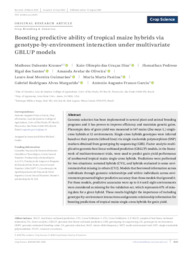Boosting predictive ability of tropical maize hybrids via genotype-by-environment interaction under multivariate GBLUP models.
Boosting predictive ability of tropical maize hybrids via genotype-by-environment interaction under multivariate GBLUP models.
Autoria: KRAUSE, M. D.; DIAS, K. O. das G.; SANTOS, J. P. R. dos; OLIVEIRA, A. A. de; GUIMARAES, L. J. M.; PASTINA, M. M.; MARGARIDO, G. R. A.; GARCIA, A. A. F.
Resumo: Genomic selection has been implemented in several plant and animal breeding programs and it has proven to improve efficiency and maximize genetic gains. Phenotypic data of grain yield was measured in 147 maize (Zea mays L.) singlecross hybrids at 12 environments. Single-cross hybrids genotypes were inferred based on their parents (inbred lines) via single nucleotide polymorphism (SNP) markers obtained from genotyping-by-sequencing (GBS). Factor analytic multiplicative genomic best linear unbiased prediction (GBLUP) models, in the framework of multienvironment trials, were used to predict grain yield performance of unobserved tropical maize single-cross hybrids. Predictions were performed for two situations: untested hybrids (CV1), and hybrids evaluated in some environments but missing in others (CV2). Models that borrowed information across individuals through genomic relationships and within individuals across environments presented higher predictive accuracy than those models that ignored it. For these models, predictive accuracies were up to 0.4 until eight environments were considered as missing for the validation set, which represents 67% of missing data for a given hybrid. These results highlight the importance of including genotype-by-environment interactions and genomic relationship information for boosting predictions of tropical maize single-cross hybrids for grain yield.
Ano de publicação: 2020
Tipo de publicação: Artigo de periódico
Unidade: Embrapa Milho e Sorgo
Palavras-chave: Genótipo, Melhoramento Genético Vegetal, Milho
Observações
1 - Por padrão são exibidas publicações dos últimos 20 anos. Para encontrar publicações mais antigas, configure o filtro ano de publicação, colocando o ano a partir do qual você deseja encontrar publicações. O filtro está na coluna da esquerda na busca acima.
2 - Para ler algumas publicações da Embrapa (apenas as que estão em formato ePub), é necessário ter, no celular ou computador, um desses softwares gratuitos. Sistemas Android: Google Play Livros; IOS: iBooks; Windows e Linux: software Calibre.
Acesse outras publicações
Acesse a Base de Dados da Pesquisa Agropecuária (BDPA) para consultar o acervo completo das bibliotecas da Embrapa.

